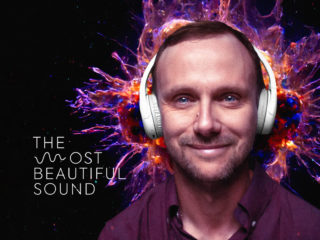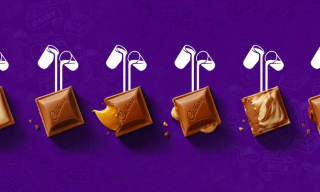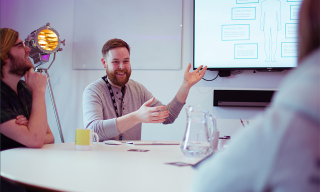Let’s start things off with three questions—
1. How come Dell Technologies were awarded a Cannes Lion in Pharma?
2. What are Samsung doing winning a Grand Clio in health?
3. Why did Grey Group go to the trouble to record the sound of a cancer cell dying?
I have on good authority there was a protracted discussion in the jury room when Dell shared ‘I will always be me’ –
“Why is this in the health / pharma category?”
“This is a tech firm, not pharma”
But think about it for a second. This is about people’s health. It’s about a disease (MND). It’s about a creative solution to a healthcare problem faced by thousands, and their families.

Samsung showing up
Now let’s turn to Samsung for a minute. They don’t really need to invest money in smart headphones, do they? They already have enough products saturating the market, most of which are generally well-liked already.
Why turn their lens to autistic kids? (besides there being 70 million people on the autism spectrum, so there is that) But that’s what they did. They offered a creative solution to a problem and did it without being asked.
Big brands and big agencies have realised that pharma and healthcare advertising isn’t about patients anymore. It’s about people.

The folks at Grey must have had to jump through about a billion hoops to land ‘The Most Beautiful Sound’. The compliance, the technical setup, the claims! Oh man, the claims!! But they persevered, and they did something remarkable—as witnessed in the faces of those who heard the noise. Hats off to all of those involved.
Do the right thing
Big brands and big agencies are starting to realise pharma and healthcare advertising isn’t about patients anymore. It’s about people.
Dell are being ‘proactive’ as a brand. Doing something because they can, rather than should. Samsung are making a statement about themselves: we are here for all of our customers; we are not just about big tellys and smart fridges.
It was incredibly difficult for the folks at Grey to even achieve what they did from a technical point of view, but they did it and were rightly honoured—but it was for the people who were dealing with cancer, not for the trophy cabinet.
Traditional methods have become painfully ineffective. In response, the landscape of healthcare engagement is moving on, adopting a language that’s more empathetic, more collaborative, and more human. It’s moving away from judgment to understanding and support, making it far more impactful.
You talkin’ to me?
Brands who continue to try and sound like an HCP, pronounce like a consultant, or point out the deficiencies of everyday lives and poor health regimes are on the way out.
Meanwhile, brands that aim to connect with people—brands that deal in empathy, practical help, everyday support, and humility are going to win out.



